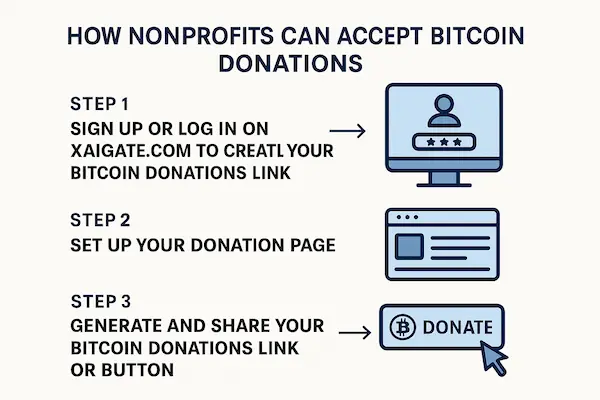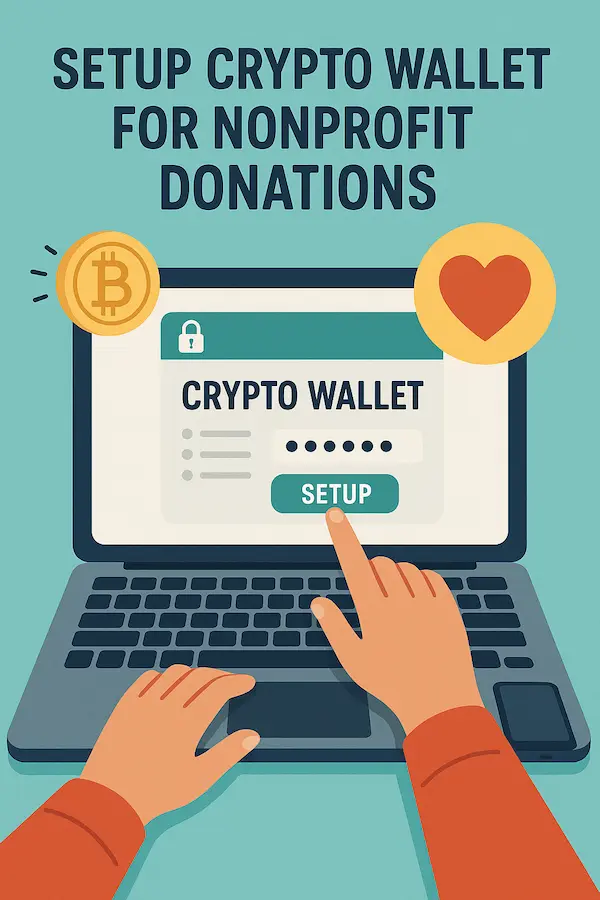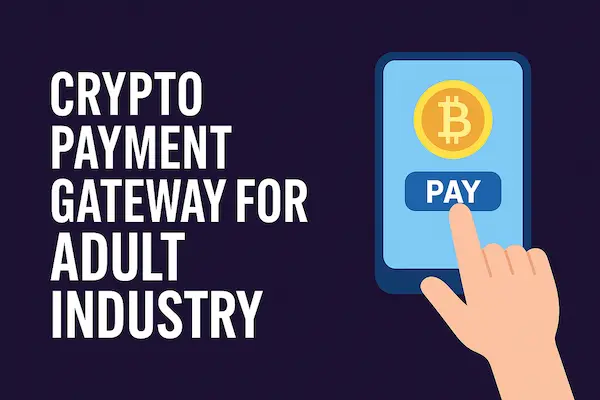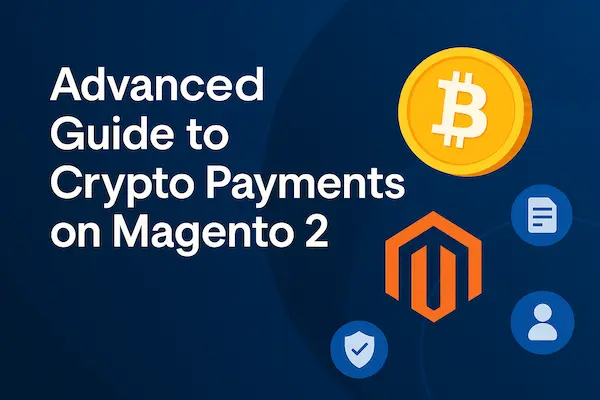Digital revolution is being experienced in the world of charitable giving. With the spread of the cryptocurrency into the mainstream, nonprofits in America are coming up with innovative ways how to reach the tech-savvy donors. Mobile crypto wallet payment has become one of the game-changers, based on the fact that, it enables organizations to accept Bitcoin donations easily and safely.
The handbook discusses in detail how nonprofits can utilize the potential of Bitcoin to increase their funding capabilities, cut down the costs of transactions and make it possible to attract a new generation of digital-first donors.
Contents
- 1 Understanding Bitcoin Donations for Nonprofits
- 2 Setting Up Your Nonprofit for Bitcoin Donations
- 3 Popular Bitcoin Donations Solutions
- 4 Implementing Bitcoin Donation Campaigns
- 5 Security and Risk Management
- 6 Tax Implications and Reporting
- 7 Measuring Success and ROI
- 8 Common Challenges and Solutions
- 9 Future Trends and Opportunities
- 10 Frequently Asked Questions
- 11 Conclusion
Understanding Bitcoin Donations for Nonprofits
The use of Bitcoin as a donation stands as an opportunity for charitable organizations. The use of cryptocurrency in payment has advantages over the traditional methods, especially in aspects that fall in line with the interests of the nonprofits; transparency, universal accessibility, and low transaction costs.
A lot has been developed in the mobile crypto wallet payment ecosystem and it has become easier than ever that donors as well as the nonprofits to engage in transactions of cryptocurrencies. Other big organizations such as the United Way, Save the Children and the American Red Cross have already found a way to incorporate the Bitcoin donation systems with impressive results.
Why Bitcoin Donations Are Growing
Several factors contribute to the increasing popularity of Bitcoin donations:
- Lower transaction fees compared to credit card processing
- Instant global transactions without currency conversion
- Enhanced privacy for donors who prefer anonymity
- Appeal to younger demographics who are comfortable with digital currencies
- Potential tax advantages through appreciated asset donations
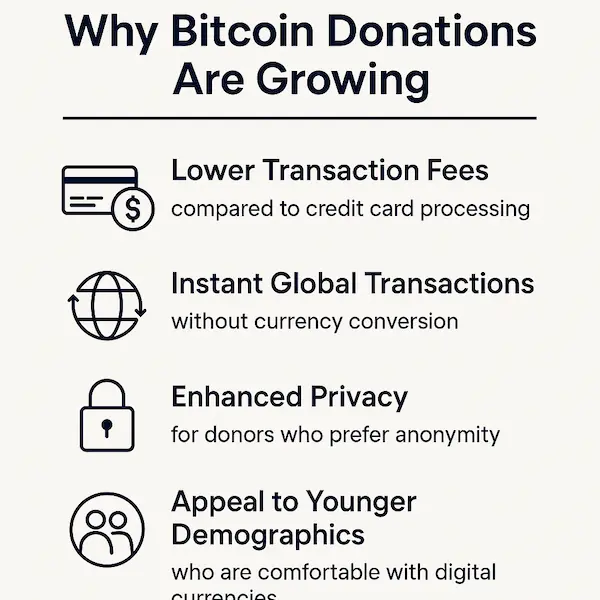
Setting Up Your Nonprofit for Bitcoin Donations
Legal and Compliance Considerations
Before implementing a bitcoin donations platform, nonprofits must address several legal requirements:
IRS Guidelines: The Internal Revenue Service treats Bitcoin as property, not currency. This classification means donations are valued at fair market value when received, and donors can claim deductions based on this amount.
State Regulations: Different states have varying requirements for cryptocurrency handling. Organizations must ensure compliance with local laws regarding digital asset management.
Documentation Requirements: Proper record-keeping becomes crucial when dealing with Bitcoin donations. Nonprofits must maintain detailed transaction logs, including timestamps, wallet addresses, and conversion rates.
Choosing the Right Mobile Crypto Wallet
|
Wallet Type |
Advantages |
Disadvantages |
Best For |
|
Custodial Wallets |
User-friendly, customer support, automatic backups |
Less control, potential security risks |
Beginners, small organizations |
|
Non-Custodial Wallets |
Full control, enhanced security, privacy |
More complex, user responsible for security |
Tech-savvy organizations |
|
Multi-Signature Wallets |
Enhanced security, shared control, audit trails |
Complex setup, requires multiple parties |
Large nonprofits, boards |
Technical Implementation Process
The process of integrating a bitcoin donations platform involves several key steps:
- Wallet Selection and Setup: Choose a reputable wallet provider that offers nonprofit-specific features
- Security Configuration: Implement multi-factor authentication and secure backup procedures
- Integration with Existing Systems: Connect the wallet to your current donation processing platform
- Staff Training: Educate team members on cryptocurrency handling and security best practices
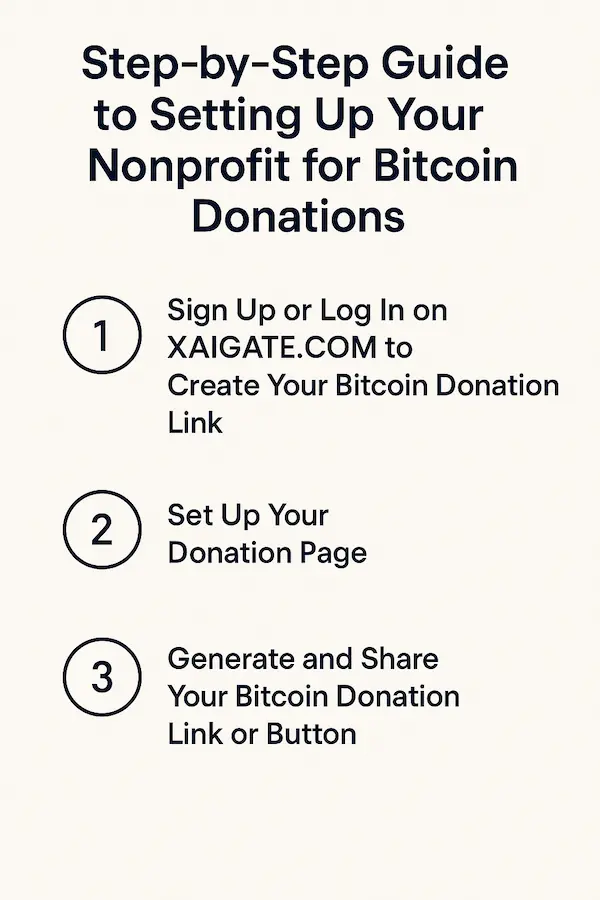
Popular Bitcoin Donations Solutions
XAIGATE
XAIGATE is a secure and user-friendly platform that lets you accept Bitcoin donations effortlessly. With fast integration, transparent tracking, and multi-currency support, XAIGATE is the smart choice for modern crypto fundraising.
XAIGATE emerges as a powerful solution to accept Bitcoin donations, offering a streamlined experience for individuals, charities, and organizations of all sizes. The platform offers:
-
Fast and secure Bitcoin payment processing
-
Transparent transaction tracking via blockchain
-
Easy integration with websites and donation pages
-
Support for multiple cryptocurrencies including Ethereum and USDT
“XAIGATE has simplified our crypto donation setup while giving us full transparency and control—it’s exactly what we needed,” says Thomas Lee, Operations Manager at Horizon Aid Network.
BitPay
BitPay stands out as a leading bitcoin donations platform solution specifically designed for businesses and nonprofits. The platform offers:
- Instant conversion to US dollars
- Comprehensive reporting tools for tax compliance
- Integration capabilities with popular fundraising platforms
- Multi-currency support beyond Bitcoin
“BitPay has revolutionized how we handle cryptocurrency donations, making the process as simple as accepting credit cards,” says Sarah Johnson, Development Director at Green Future Foundation.
Coinbase Commerce
Coinbase Commerce provides another excellent option for nonprofits seeking a reliable bitcoin donations platform:
- No monthly fees for basic services
- Easy integration with existing websites
- Automatic conversion options
- Detailed analytics and reporting features
Blockchain.com
For organizations preferring more control over their cryptocurrency holdings, Blockchain.com offers:
- Non-custodial wallet options
- Advanced security features including hardware wallet integration
- Real-time market data for informed decision-making
- Educational resources for staff and donors
Implementing Bitcoin Donation Campaigns
Creating Compelling Campaigns
Successful Bitcoin donation campaigns require thoughtful planning and execution. The bitcoin donations platform system should integrate seamlessly with your overall fundraising strategy.
Target Audience Research: Understanding your donor base is crucial. Cryptocurrency donors often represent a younger, more tech-savvy demographic with specific motivations and preferences.
Campaign Messaging: Emphasize the innovative nature of Bitcoin donations while highlighting tangible impacts. Use phrases like “Be part of the future of giving” or “Your Bitcoin donation creates lasting change.”
Visual Design: Incorporate cryptocurrency symbols and modern design elements that resonate with digital-native supporters.
Marketing Strategies
|
Strategy |
Description |
Expected ROI |
Implementation Difficulty |
|
Social Media Campaigns |
Leverage platforms like Twitter and Reddit where crypto communities thrive |
High |
Medium |
|
Influencer Partnerships |
Collaborate with cryptocurrency advocates and blockchain influencers |
Very High |
High |
|
Educational Content |
Create tutorials and guides about cryptocurrency donations |
Medium |
Low |
Donor Education and Support
Many potential donors may be unfamiliar with Bitcoin donation processes. Providing comprehensive educational resources helps overcome barriers:
- Step-by-step guides for using bitcoin donations platform
- Video tutorials demonstrating the donation process
- FAQ sections addressing common concerns
- Live chat support during campaign periods
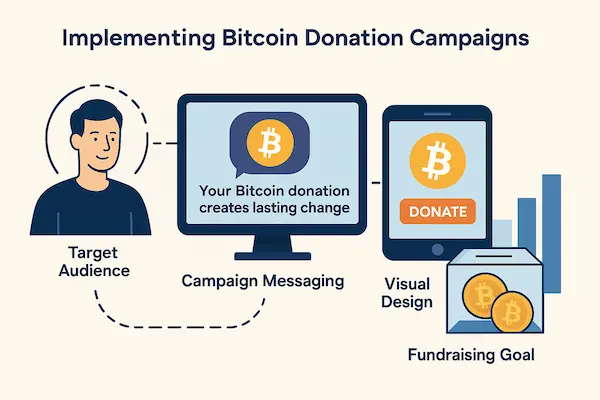
Security and Risk Management
Best Practices for Wallet Security
Security remains paramount when handling Bitcoin donations. Organizations must implement robust security measures:
Multi-Factor Authentication: Always enable two-factor authentication on all accounts related to your bitcoin donations platform.
Regular Security Audits: Conduct periodic reviews of your security protocols and update them as needed.
Staff Training: Ensure all team members understand security best practices and can identify potential threats.
Backup Procedures: Maintain secure, offline backups of wallet keys and recovery phrases.
Risk Mitigation Strategies
|
Risk Type |
Mitigation Strategy |
Implementation Cost |
Effectiveness |
|
Price Volatility |
Immediate conversion to USD |
Low |
High |
|
Regulatory Changes |
Legal compliance monitoring |
Medium |
High |
|
Technical Failures |
Redundant systems and backups |
High |
Very High |
|
Fraud Attempts |
Multi-signature requirements |
Medium |
High |
Insurance and Protection
Consider obtaining cryptocurrency insurance to protect against potential losses. Several providers offer coverage specifically designed for organizations handling digital assets.
Tax Implications and Reporting
IRS Requirements
The IRS requires detailed reporting for Bitcoin donations. Organizations must:
- Record fair market value at the time of donation
- Maintain transaction records including dates, amounts, and wallet addresses
- Issue proper receipts to donors for tax deduction purposes
- Report donations on annual tax returns
Donor Tax Benefits
Donors can potentially benefit from significant tax advantages when donating Bitcoin:
Appreciated asset donations allow donors to avoid capital gains taxes while claiming the full fair market value as a deduction. This creates a win-win situation for both donor and nonprofit.
Professional Guidance
Working with tax professionals experienced in cryptocurrency transactions is essential. They can help ensure compliance with evolving regulations and maximize tax benefits for both organization and donors.
Measuring Success and ROI
Key Performance Indicators
Track these metrics to evaluate your Bitcoin donation program’s effectiveness:
- Total donation volume in Bitcoin and USD equivalent
- Number of unique donors using bitcoin donations platform.
- Average donation size compared to traditional methods
- Conversion rates from campaign exposure to actual donations
- Donor retention rates for cryptocurrency contributors
Analytics and Reporting
Most bitcoin donations platform provide comprehensive analytics tools. Regular analysis helps optimize campaigns and identify trends.
Long-term Impact Assessment
Beyond immediate fundraising results, consider the broader impact of accepting Bitcoin donations:
- Brand positioning as an innovative organization
- Donor base expansion into new demographics
- Operational efficiency improvements through reduced processing costs
- Global reach enhancement through borderless transactions
Common Challenges and Solutions
Technical Challenges
Integration Complexity: Many nonprofits struggle with integrating bitcoin donations platform systems with existing platforms.
Solution: Start with user-friendly platforms like BitPay or Coinbase Commerce that offer extensive integration support.
Staff Training: Team members may feel overwhelmed by cryptocurrency technology.
Solution: Implement gradual training programs and provide ongoing support resources.
Donor Adoption
Lack of Awareness: Many supporters may not know about Bitcoin donation options.
Solution: Implement comprehensive educational campaigns and provide clear, step-by-step guidance.
Trust Concerns: Some donors worry about security and legitimacy.
Solution: Highlight security measures and share success stories from other reputable organizations.
Future Trends and Opportunities
Emerging Technologies
The bitcoin donations platform landscape continues evolving with new technologies:
- Lightning Network for faster, cheaper transactions
- Decentralized Finance (DeFi) integration for enhanced functionality
- Smart contracts for automated donation processing
- Non-Fungible Tokens (NFTs) for unique donor recognition
Regulatory Evolution
As cryptocurrency regulations mature, nonprofits can expect:
- Clearer compliance guidelines from regulatory bodies
- Improved tax reporting tools and standards
- Enhanced security requirements and best practices
- Greater institutional adoption across the nonprofit sector
Market Growth Projections
Industry experts predict continued growth in cryptocurrency donations, driven by:
- Increasing mainstream adoption of digital currencies
- Generational wealth transfer to crypto-savvy demographics
- Improved user experience in bitcoin donations platform
- Enhanced integration with traditional fundraising tools
Frequently Asked Questions
1. Is it legal for nonprofits to accept Bitcoin donations?
Yes, it is legal for 501(c)(3) organizations to accept Bitcoin donations in the United States. However, proper compliance with IRS regulations and state laws is essential.
2. How do we determine the value of Bitcoin donations for tax purposes?
The IRS requires using the fair market value of Bitcoin at the time of donation. Most bitcoin donations platforms automatically provide this information.
3. What happens if Bitcoin’s value changes after we receive a donation?
The donation value is locked in at the moment of receipt. Any subsequent price changes don’t affect the recorded donation amount or the donor’s tax deduction.
4. Can we convert Bitcoin donations to cash immediately?
Yes, most bitcoin donations platform services offer instant conversion to USD to minimize volatility risk.
5. How do we issue tax receipts for Bitcoin donations?
Issue receipts showing the USD value at the time of donation, similar to other non-cash donations. Include all required information per IRS guidelines.
6. Are there minimum donation amounts for Bitcoin gifts?
While there’s no legal minimum, many platforms set small minimum amounts to cover transaction fees effectively.
7. What security measures should we implement?
Implement multi-factor authentication, regular security audits, staff training, and secure backup procedures for your bitcoin donations platform system.
8. How can we attract Bitcoin donors?
Focus on younger demographics through social media, provide educational content, and highlight the innovative aspects of cryptocurrency donations.
Conclusion
The mobile crypto wallet payment system to accept Bitcoin as a form of payment is a huge opening to nonprofits to improve their donor-raising capacities and gaining access to new donor pools. Although it needs to be implemented with much consideration and observation about the security and its compatibilities, the resources which it offers make it a resourceful investment to organizations thinking ahead.
Assessing the adequate platform to use, application of good security measures, and training of the staff and donors on the process is a key to success. Cryptocurrency usage and acceptance are only increasing, which means that an early implementation of the technology by nonprofits will place them in a good position to take advantage of the growing digital giving environment.
With your organization using the strategies and best practices discussed in this guide, not only are you going to be able to utilize donations of Bitcoin into your current fundraising arsenal, you can do so yet create new opportunities of creating impact, as well as becoming an innovator in the non-profit sector. It is certainly the case that charitable giving in the future is digital and bitcoin donations platform solutions represent the entry point to this attractive new space.
To learn more: Step-by-step guide how Nonprofits can accept crypto donations

